ADD1 Antibody (aa411-460)
Rabbit Polyclonal Antibody
- SPECIFICATION
- CITATIONS
- PROTOCOLS
- BACKGROUND

Application
| IHC-P, IF, E |
|---|---|
| Primary Accession | P35611 |
| Reactivity | Human, Mouse, Rat |
| Host | Rabbit |
| Clonality | Polyclonal |
| Calculated MW | 81kDa |
| Dilution | ELISA (1:10000), IF (1:100-1:500), IHC-P (10 µg/ml) |
| Gene ID | 118 |
|---|---|
| Other Names | Alpha-adducin, Erythrocyte adducin subunit alpha, ADD1, ADDA |
| Target/Specificity | ADD1 Antibody detects endogenous levels of total ADD1 protein. |
| Reconstitution & Storage | Long term: -20°C; Short term: +4°C; Avoid freeze-thaw cycles. |
| Precautions | ADD1 Antibody (aa411-460) is for research use only and not for use in diagnostic or therapeutic procedures. |
| Name | ADD1 |
|---|---|
| Synonyms | ADDA |
| Function | Membrane-cytoskeleton-associated protein that promotes the assembly of the spectrin-actin network. Binds to calmodulin. |
| Cellular Location | Cytoplasm, cytoskeleton. Cell membrane; Peripheral membrane protein; Cytoplasmic side |
| Tissue Location | Expressed in all tissues. Found in much higher levels in reticulocytes than the beta subunit |
| Volume | 50 µl |

Thousands of laboratories across the world have published research that depended on the performance of antibodies from Abcepta to advance their research. Check out links to articles that cite our products in major peer-reviewed journals, organized by research category.
info@abcepta.com, and receive a free "I Love Antibodies" mug.
Provided below are standard protocols that you may find useful for product applications.
Background
Membrane-cytoskeleton-associated protein that promotes the assembly of the spectrin-actin network. Binds to calmodulin.
References
Joshi R.L.,et al.J. Cell Biol. 115:665-675(1991).
Goldberg Y.P.,et al.Hum. Mol. Genet. 1:669-675(1992).
Lin B.,et al.Genomics 25:93-99(1995).
Ota T.,et al.Nat. Genet. 36:40-45(2004).
Hillier L.W.,et al.Nature 434:724-731(2005).
If you have used an Abcepta product and would like to share how it has performed, please click on the "Submit Review" button and provide the requested information. Our staff will examine and post your review and contact you if needed.
If you have any additional inquiries please email technical services at tech@abcepta.com.













 Foundational characteristics of cancer include proliferation, angiogenesis, migration, evasion of apoptosis, and cellular immortality. Find key markers for these cellular processes and antibodies to detect them.
Foundational characteristics of cancer include proliferation, angiogenesis, migration, evasion of apoptosis, and cellular immortality. Find key markers for these cellular processes and antibodies to detect them. The SUMOplot™ Analysis Program predicts and scores sumoylation sites in your protein. SUMOylation is a post-translational modification involved in various cellular processes, such as nuclear-cytosolic transport, transcriptional regulation, apoptosis, protein stability, response to stress, and progression through the cell cycle.
The SUMOplot™ Analysis Program predicts and scores sumoylation sites in your protein. SUMOylation is a post-translational modification involved in various cellular processes, such as nuclear-cytosolic transport, transcriptional regulation, apoptosis, protein stability, response to stress, and progression through the cell cycle. The Autophagy Receptor Motif Plotter predicts and scores autophagy receptor binding sites in your protein. Identifying proteins connected to this pathway is critical to understanding the role of autophagy in physiological as well as pathological processes such as development, differentiation, neurodegenerative diseases, stress, infection, and cancer.
The Autophagy Receptor Motif Plotter predicts and scores autophagy receptor binding sites in your protein. Identifying proteins connected to this pathway is critical to understanding the role of autophagy in physiological as well as pathological processes such as development, differentiation, neurodegenerative diseases, stress, infection, and cancer.



